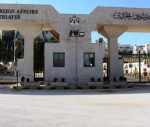You are here
Sanctions kill
Dec 01,2021 - Last updated at Dec 01,2021
Sanctions kill. The most notorious example of killer sanctions was imposed by the US and its Western allies on Iraq after it invaded Kuwait in August 1990. These sanctions were not restricted to military materiel but severely limited the provision of food and medical supplies for Iraqi civilians who died of malnourishment and preventable diseases.
In a 1996 television interview, Leslie Stahl asked former US-Secretary of State Madeline Albright, who assumed the post in 1997, "We have heard that half a million children have died... is the price worth it?"
She replied, "I think this is a very hard choice. But the price — we think the price is worth it." At that time, the estimate of fatalities was 575,000.
In December 1996, the UN implemented the oil-for-food programme which alleviated some of the most brutal aspects of the sanctions regime but it remained in place until after the US conquest of Iraq in 2003. Protracted sanctions plus the two US wars on Iraq produced an outflow of millions of Iraqis which continues today with hundreds seeking asylum in Europe along with Syrians, Afghans, Somalis and others from countries suffering from sanctions.
Former UN Humanitarian Coordinator for Iraq, Denis Halliday, said in 1999. "We are
now... responsible for killing people, destroying their families, allowing their older parents to die for lack of basic medicines...We're allowing children to die who were not born yet when [Iraqi President] Saddam Hussein made the mistake of invading Kuwait."
Despite widespread high-level criticisms of its use of sanctions, Washington has continued to bludgeon recalcitrant governments to force them to capitulate to US political and economic demands. In a 1998 report for the Brookings Institution, former State Department director of policy planning Richard Haass called sanctions the "policy tool of choice for the United States in the post cold-war world" and pointed out that the US "maintains economic sanctions against dozens of countries".
Haass warned that sanctions are "blunt instruments that often produce unintended and undesirable consequences". He cited the cases of Haiti where sanctions caused "economic distress" that led to an exodus of Haitians to the US and Pakistan where weapons embargoes “increased its reliance on a nuclear option".
Although sanctions also harm US businesses and farmers exporting their products and produce to embargoed countries, Haass pointed out, "Sanctions tend to be easier to introduce than to lift" as it is "difficult or impossible to build a consensus for rescinding a sanction, even if there has been some progress on the matter of concern, if the sanction has been shown to be feckless or counterproductive, or if other interests can be shown to suffer".
Haass concluded, "All too often, the economic, humanitarian and foreign policy costs of US sanctions far outweigh any benefits."
At present, the US imposes sanctions on dozens of countries or their citizens, including Afghanistan, Belarus, Burundi, Central African Republic, China, Côte d'Ivoire, Crimea, Cuba, North Cyprus, North Korea, Veezuela, the Democratic Republic of the Congo, Eritrea, Haiti, Iran, Yemen, Syria, Hong Kong, Lebanon, Libya, Myanmar, Russia and Iraq. Separate sanctions number in the tens of thousands.
Haass was a critic of the Biden administration's "withdrawal of choice" from Afghanistan in 2021 as, in his view, the US should have left its troops in that country. The mission had not been accomplished, US military presence was not "untenable" and troops were still "welcomed by the host government". Therefore, Haass argued, "Withdrawal was a choice, and, as is often true of wars of choice, the results promise to be tragic." Sanctions contribute heavily to the tragedy.
Afghanistan is the most egregious ongoing example of the use by the West of sanctions to punish 38 million civilians who are now ruled by the Taliban, Pushtun irregulars who defeated the mighty Nato alliance, led by the US. The flow of hard currency into the country has stopped, the GDP has shrunk by 40 per cent, the economy is broken, banks dole out small amounts of local cash to desperate depositors, salaried workers have not been paid in months, women with jobs are told to stay at home depriving their families of essentials, children are being sold and drought has reduced the annual harvest of food crops.
In October, UN Development Programme chief, Achim Steiner, warned, “We have to step in, we have to stabilise a 'people's economy’ and in addition to saving lives, we also have to save livelihoods. Because otherwise, we will indeed confront a scenario through this winter and into next year where millions and millions of Afghans are simply unable to stay on their land, in their homes, in their villages and survive.” He said $660 million will be needed over the next 12 months for a fund to support local communities by providing cash to organisations and Afghan workers in public works programmes. A basic income would be paid to elderly and disabled people and grants given to micro-enterprises. The UN has begun COVID and polio vaccination drives.
Despite UN efforts, Dominik Stillhart, director of operations for the International Committee of the Red Cross, has called the situation in Afghanistan a "catastrophe". At the end of a six-day visit to that country in late November, he stated, "I am livid. Pictures viewed from afar of bone-thin children tightly elicit gasps of horror. When you're standing in the paediatric ward in Kahdahar's largest hospital, looking into the empty eyes of hungry children and the anguished faces of desperate parents, the situation is absolutely infuriating. It is so infuriating because this suffering is man-made. Economic sanctions meant to punish those in power in Kabul are instead freezing millions of people across Afghanistan out of the basics they need to survive." He accused the international community of turning its back on Afghanistan.
World Food Programme director, David Beasley described the situation in Afghanistan “as bad as you possibly can imagine". Afghanistan is becoming the “worse humanitarian crisis we have ever seen“.













